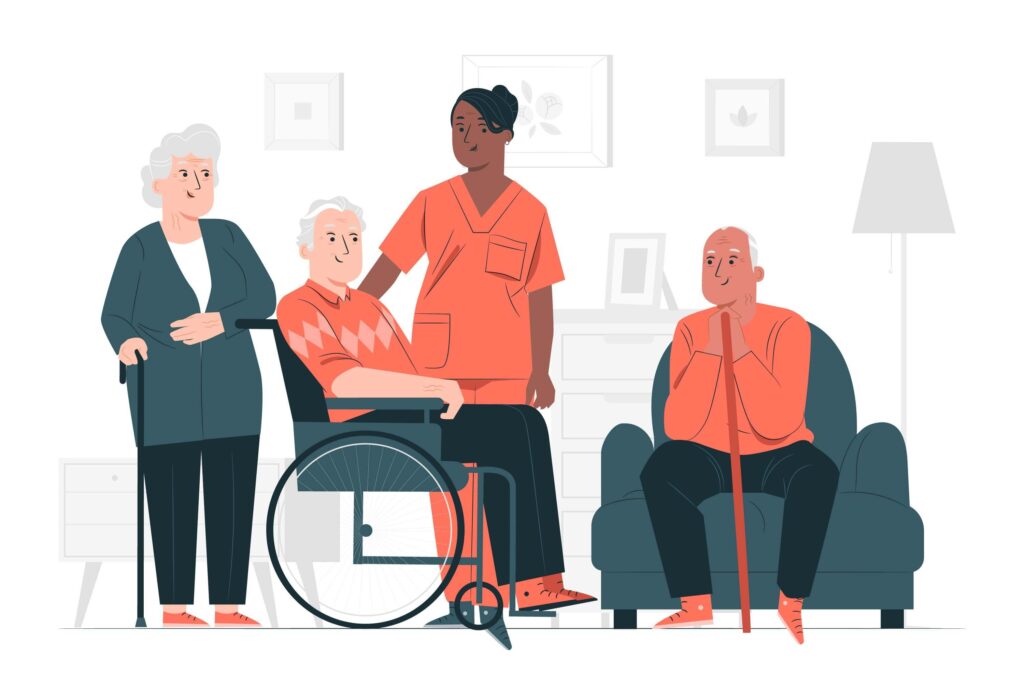
Nursing care homes are designed to support people with ongoing medical needs. It is a place where skilled nurses offer 24-hour care in a warm and professional environment. Therefore, if someone struggles with daily life because of serious health issues, a nursing care home can help.
Also called care homes with nursing, these homes support people with conditions like dementia, severe disabilities, or terminal illnesses. Many residents are older adults who can no longer live safely at home. Some may have suffered a stroke or need artificial feeding due to difficulty swallowing. Others may be battling cancer, sensory impairments, or require end-of-life care.
They can spot early signs of illness and act fast. GPs, physiotherapists, and other specialists often visit to help assess and adjust each person’s care plan. Because of this, families feel more confident knowing their loved ones are in expert hands.

What’s the Difference Between a Nursing Care Home and a Residential Care Home?
Though the names may sound alike, a nursing care home is different from a residential care home. Both offer 24-hour support. However, nursing care homes are focused more on medicals.
In a residential care home, trained staff help with daily tasks like washing, dressing, and taking medicine. Yet, they are not qualified to offer medical care. That’s where nursing homes come in.
Nursing care homes have registered nurses on duty at all times. This is why they are better suited for people with serious medical conditions. If someone needs regular injections, wound care, or help with complex medication routines, a nursing care home is the right choice.
In both settings, residents enjoy social activities, meals, and outings. But nursing care homes go a step further by blending health care with community life.
How Much Does a Nursing Care Home Cost?
Cost is often the first question people ask. On average, staying in a nursing care home in the UK costs about £1,528 per week. In comparison, residential homes average around £1,266 per week.
But why the higher cost? The reason is simple. Nursing homes offer more advanced care. They have more medical equipment, more trained staff, and greater resources. So, while the cost may seem high, it reflects the level of care provided.
Prices vary by location. For example, nursing care homes in London or the South East may charge more than those in the Midlands. It’s always good to compare.
Signs Someone Might Need a Nursing Care Home
Choosing a nursing care home isn’t easy. However, there are signs it may be the right move. If someone is frequently in the hospital, can’t manage personal care, or needs medical attention every day, it’s time to consider it.
People with advanced conditions like Parkinson’s or multiple sclerosis often benefit from the expert support that only a nursing care home provides. Some just need a safe space where care is always within reach.
One family shared how their father, after a stroke, needed round-the-clock care. Living at home became risky. After moving into a nursing care home, his health stabilised, and he even made friends.
What Makes a Nursing Care Home Different?
A key difference lies in the care team. Nursing care homes employ registered nurses and trained care staff. This means residents get both medical and emotional support.
Besides medical help, these homes focus on quality of life. Daily routines are carefully planned. Meals are balanced and nutritious. Activities like music therapy, puzzles, and gardening help residents stay engaged.
Also, safety features like bed alarms, fall sensors, and secure entry systems are standard. Families can rest easier knowing their loved ones are protected day and night.
Can Nursing Care Homes Handle Special Conditions?
Yes, they can. Whether it’s cancer care, IV antibiotics, or advanced dementia, nursing care homes have the tools and training to help. They work closely with NHS services, so residents often receive treatments without needing to go to the hospital.
Some homes also specialise. For example, certain facilities focus on substance abuse recovery, while others are experts in palliative care. Always ask what conditions the staff are trained to support.
What About STDs and Other Sensitive Health Needs?
It might surprise you, but STDs can occur in nursing care homes. Therefore, staff receive training in sexual health and resident privacy. The goal is to ensure safety without judgement. Open communication and regular health checks help manage risks.
Are There Nursing Homes Without Walls?
Yes, ‘nursing homes without walls’ is a term used for community-based care. Instead of living in a facility, people get nursing support at home. This is a growing trend, especially for those who want to stay in familiar surroundings.
However, it’s not suitable for everyone. People with very complex needs may still need full-time residential care. Even so, this model is opening up new options for elderly care.
Who Pays for Nursing Care Home Services?
Paying for a nursing care home depends on your financial situation and care needs. The first step is to request a needs assessment from your local council. This helps determine if you qualify for funding support.
If you’re eligible, the local authority may cover some or all of your fees. If not, you’ll need to self-fund. Fortunately, several benefits can ease the financial load.
For instance, Attendance Allowance (AA) helps those over 65 who need extra help. Funded Nursing Care (FNC) provides a fixed contribution from the NHS for nursing care. For people with serious health conditions, Continuing Healthcare (CHC) might cover all costs. CHC is granted if you have a ‘primary health need’, such as advanced cancer or severe dementia.
It’s smart to explore these options early. Care fees add up quickly, and many families find it hard to pay out of pocket.
Nursing Homes in Popular UK Locations
If you’re searching for a nursing care home, location matters. Some top spots in the UK include:
- Nursing homes in Birmingham – Known for a wide range of services and specialist care.
- Nursing homes in Manchester – Many offer dementia-specific support.
- Nursing homes in Aylesbury – Often praised for beautiful countryside settings.
- Nursing homes in Eastbourne – Popular for its peaceful seaside atmosphere.
Always visit in person when possible. Look for clean rooms, happy residents, and caring staff. Online reviews help too, but a tour says the most.
Are Nursing Homes Like Prisons?
Not at all. Residents enjoy freedom, privacy, and dignity. Although safety measures exist, they’re meant to protect, not confine.
Unlike prisons, nursing homes are places of healing and community. Many people form friendships, take part in hobbies, and even rediscover old passions.
FAQs About Nursing Care Homes
Are nursing homes free?
Not usually. Most people either pay privately or receive some financial help from the local authority.
Can nursing homes give IV antibiotics?
Yes, many nursing homes are equipped to administer IV medications on-site.
Which nursing homes accept Medicaid?
In the UK, the equivalent is local authority funding or NHS care contributions, depending on need.
Why nursing homes are good?
They offer skilled care, social interaction, and peace of mind for families.
Will nursing homes take all your money?
Not if you’re eligible for funding help. Financial assessments and benefits exist to support you.
Nursing care homes vs residential care homes?
Nursing homes provide medical care. Residential homes focus on personal daily support.
